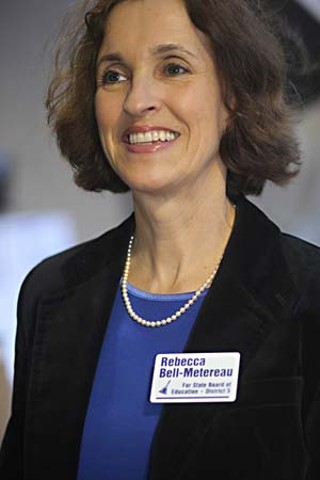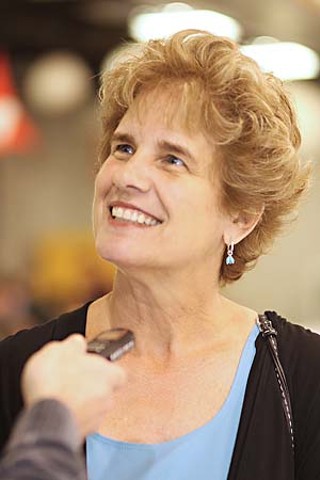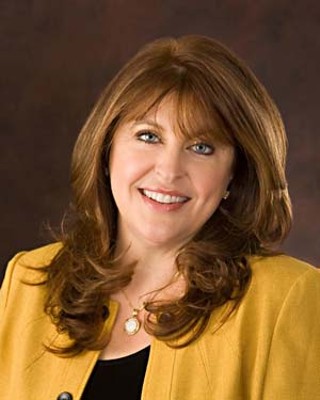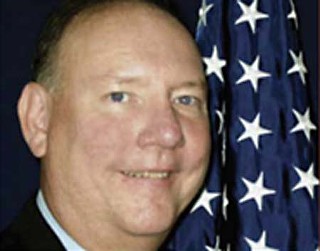SBOE Candidates Get 'A' for Attendance
SBOE debate clarifies candidates' differences in one race, similarities in another
By Lee Nichols, Fri., Oct. 15, 2010

The Democrats and Republicans running for Austin's two State Board of Education seats finally met. After the Republicans ducked a League of Women Voters forum, claiming that Austin's LWV chapter was too Democratic (and thus untrustworthy), a Monday morning event at the Downtown offices of the Texas Business & Education Coalition marked the first occasion for the major party candidates to face off. In one race, the differences couldn't have been clearer. In the other, voters may have to look more closely at the details to make their decisions.
In District 5 (which includes Travis County south of the river, much of the Hill Country, and northern San Antonio), Democrat Rebecca Bell-Metereau and incumbent Republican Ken Mercer were like night and day. Bell-Metereau seemed every bit the Texas State English professor that she is, calmly insisting that education policy should be driven by teachers and academic experts. Typical was her response to a question about cooperating with the Legislature: "I believe that the State Board of Education can recommend ideas to the Legislature based on research, based on data – not based on my particular opinion, my pet beliefs, but based on what those who study education have discovered are the best practices," she said, clearly referring to the crusades waged by Mercer and others in the SBOE's fundamentalist bloc, which has pushed a right-wing religious agenda.
Mercer, by contrast, would have surprised no one if he'd reached back and begun waving the flag that was behind the podium. "When I was asked to run four years ago, it was because parents were concerned about political ideology," said Mercer, a former Texas House member from San Antonio. "We seem to find people who call themselves experts – not all, but a minority – but some experts seem to hate America, they hate our veterans and our military, and some experts oppose our system of free enterprise. That's why parents are involved." He also said he had a record of fighting "extremists" – the same word often used by critics to describe Mercer and his board allies.
Both were happy to paint their battles as old vs. new: Mercer proudly celebrated his work to return phonics (a cause common in conservative circles) to Texas' English curriculum, while Bell-Metereau said it just showed Mercer was out of touch.
"Phonics is one of my passions," said Mercer, a software engineer. "I look at the remedial rates in our colleges right now. ... Fifty percent of our kids go to college and have to have one year of remedial reading and math. They cannot read and write. Ten percent of those kids never finish a college class."

"Phonics was very popular about 50 years ago," countered Bell-Metereau. "As a teacher of English, and someone who has taught English as a second language, I can tell you that the real problem is for learners of English. People who are learning English have a problem with phonics because English is one of the least phonic languages."
Similar philosophical battles were waged between the conservative and moderate wings of the board over science and social studies curricula in recent years. When an audience member asked whether creationism should be taught in schools, Mercer acknowledged that he has been openly critical of evolution but proclaimed, "The [curriculum] standards right now do not have creationism. ... I've challenged every editorial board: Go online, pull down the standards. ... You look for anybody's faith or religion in [the] science [standards], you will not find it."
Left unsaid: Mercer argued and voted for amendments clearly designed to cast doubt on evolution – some of which passed – that were not supported by the scientists and educators who originally authored those standards.

In District 10 (Travis north of the river and all or part of 15 other counties to the east and south), Democrat Judy Jennings and Republican Marsha Farney left much less daylight between them. Both repeatedly emphasized that "teachers and experts" would be their guides, and both pointed to their extensive educational résumés – Georgetown's Farney has a doctorate in curriculum and instruction from the University of Texas at Austin; ditto for Jennings in educational psychology, and she is director of curriculum and resources at an educational nonprofit.
Indeed, it was rather bizarre to see the Republican almost taking words from the mouth of the Texas Freedom Network, a major critic of the religious right wing: "I want to work towards, in the future, to make sure that when we wind up in The New York Times next time, it's because of our higher achievements," Farney said. "Our duty is put education first, not politics. This cultural war that's been going on needs to stop."
Jennings strove to highlight what differences there are, especially that she is the only candidate who has vowed to rescind this year's controversial changes to the social studies curriculum standards. When an audience member questioned Farney for reportedly opening speeches with, "The first thing you need to know about me is that I'm a Christian," Farney replied that she only brought it up for full disclosure and as a way of saying she would "put others' needs above my own." Jennings' parry was to say, "The first thing you need to know about me is that I'm an educator."
One major difference was the competitors' stance on management of the $22 billion Permanent School Fund, which has been scrutinized for some questionable investments and conflict-of-interest issues. Jennings wants oversight of the fund moved away from the SBOE and to a body with definite financial expertise, while Farney said management of the fund should be "jealously guarded" by the board.
Monday's forum will air several times on AISD's cable access station (Channel 22) beginning on a date yet to be determined; TBEC promised video would also be posted to its website, www.tbec.org.
Got something to say on the subject? Send a letter to the editor.











